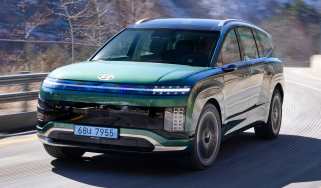Lexus LS saloon (2012-2017)
"The Lexus LS is comfortable, well equipment and extremely reliable. It's one of the most luxurious saloons around, but the top-spec model is expensive and the LS is not a car for the driving enthusiast."
Pros
- Excellent reliability
- Extremely comfortable
- Impressive equipment list
Cons
- Poor economy
- Low resale values
- Expensive hybrid version
The Lexus LS was launched as the flagship model in the Lexus range over 20 years ago and was last updated in 2013. Whichever model you care to look at, be it the entry-level petrol or range-topping hybrid, the LS comes with loads of equipment as standard and offers passengers vast amounts of space. All versions are hugely comfortable, even in F Sport trim.
The hybrid LS 600h model is intended as an executive limousine with green credentials. It can glide around town purely on electric power but also power its way to 62mph from standstill in 6.1 seconds when you put your foot down. In reality, the pure petrol LS 460 is almost as economical as the hybrid model and it’s around £25,000 cheaper, so it’s hard to recommend it on purely financial grounds.
The latest version of the LS is more striking than previous models, and build quality and interior luxury remain more than good enough to compete with cars made by Jaguar and Mercedes. Lexus has a reputation for excellent reliability too. Standard LS models come with plenty of kit, with F Sport models getting larger alloy wheels and an understated bodykit.
MPG, running costs & CO2
Thanks mainly to its enormous size and weight, the Lexus LS 600h still uses plenty of fuel despite its hybrid drive setup. The gains to be made by having an electric motor assisting a petrol engine in a car of the LS’s bulk are pretty minimal and improvements to running costs are overshadowed by the very high price of the car. The official economy figure for the LS 600h is 32.8mpg, but out on the open road, the car’s 5.0-litre V8 drags this figure much lower, making the LS 460 petrol model the more sensible choice.
More reviews
In-depth reviews
The car is not cheap to insure or to service but Lexus has an excellent reliability record, so the LS shouldn’t cost too much to maintain.
Engines, drive & performance
There are only two engines to choose from in the flagship Lexus: a 4.6-litre LS 460 petrol and a 5.0-litre LS 600h petrol-electric hybrid. The former replaced the old LS 400 and is available in Luxury and F Sport trim, doing 0-62mph in just 5.7 seconds. It feels extremely quick in a straight line, but rivals like the BMW 7 Series and Audi A8 offer similar performance with more driver enjoyment thanks to a firmer ride and more responsive steering.
Elsewhere, the expensive LS 600h hybrid only comes in long-wheelbase Premier specification and is fitted with four-wheel drive as standard, giving it plenty of grip. There's no escaping the fact this is a long, heavy car that can feel cumbersome and unstable when driven fast. Add in the slow and hesitant CVT automatic gearbox and you realise this is a car more suited to long motorway trips than narrow country roads.
Interior & comfort
This is the trump card for the LS. It offers an exceptionally smooth ride and is supremely relaxing, rivalling the class-leading Mercedes S-Class for passenger comfort. There's virtually no wind or road noise and if you choose the LS 600h hybrid, you can drive in electric-only mode up to 30mph. However, the hybrid uses a noisy CVT automatic gearbox, while the LS 460 petrol has a more conventional eight-speed automatic transmission as standard.
Ride quality is superb in all models, yet the soft suspension does compromise driver enjoyment somewhat. However, legroom is generous and if you choose the top-of-the-range long-wheelbase car, you get electrically reclining rear seats for superb comfort.
Practicality & boot space
The standard Lexus LS boasts a decent 560-litre boot. Compare that to the 510-litre Audi A8 and 500-litre BMW 7 Series and it looks like a practical executive car, with decent interior space, too. However, plump for the long-wheelbase hybrid version and although there's plenty of room in the back, the boot shrinks to just 420 litres to accommodate the battery packs under the boot floor.
Inside, there's a useful selection of cubbyholes and a pair of large door bins, as well as plenty of adjustment for the well bolstered leather seats. In the long-wheelbase car, you get reclining rear seats, making the LS feel more like a business-class airliner than a car.
Reliability & safety
A total of 10 airbags, electronic stability control and a tyre-pressure monitoring system are just part of the Lexus LS safety package. Adaptive cruise control mantains a safe distance from the car in front, while a pre-crash sensor system prepares the car for an impact before it actually happens. A lane-departure warning system is also available. This alerts you if the car veers out of its lane – useful at motorway speeds.
Lexus has a strong reputation for reliability, too, consistently finishing well in our Driver Power owner satisfaction survey. Although the LS itself didn't feature due to its relative exclusivity, the manufacturer finished first overall in 2013.
Price, value for money & options
The LS is very expensive and you can have a more traditionally desirable luxury car – such as a Jaguar XJ or Mercedes S-Class – for less. The trade-off is that you won't get anywhere near as much standard equipment as Lexus. Its spec sheet lists everything from voice-operated sat nav to electric rear blinds and air-conditioned seats. There's virtually nothing missing, so optional equipment is limited.
Lexus LS used values aren't good though, with the top-spec LS 600h hybrid likely to shed value rapidly due to its prohibitively high list price. Lease deals are worth looking at, but we recommend the 'entry-level' LS 460 petrol if value for money is top of your priority list.











